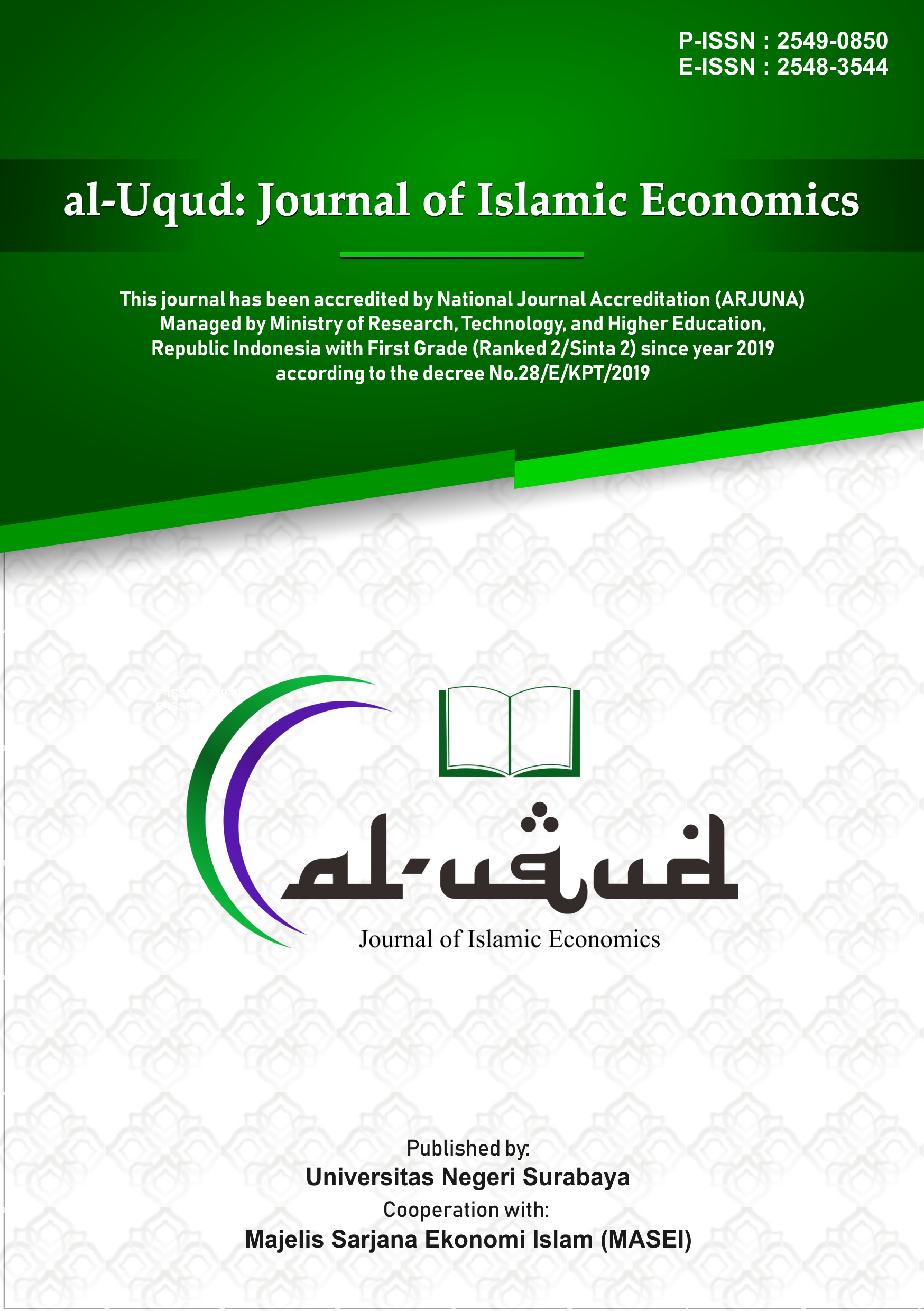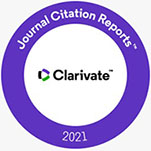The Effect of Islamic Leadership and Islamic Compensation on Employee Performance with Employee's Commitment as Moderation in Islamic Boarding School's Businesses
DOI:
https://doi.org/10.26740/aluqud.v5n2.p292-306Keywords:
Islamic Leadership, Islamic Compensation, Employee Commitment, Employee Performance, Islamic Boarding School CooperativesAbstract
This research aims to analyze the influence of Islamic leadership, Islamic compensation on employee performance with employee commitment as a moderator in Islamic boarding school cooperatives in Surabaya. This research is a research explanation research. The population in this study are employees of the boarding school's cooperative business unit. The sample is some employees in the Surabaya Islamic boarding school cooperative, which amounted to 139 respondents. The data collection technique used in this study was a survey using a questionnaire. The independent variable used in the results of this study is given an X notation, namely: Islamic leadership and Islamic compensation. The moderating variables are organizational commitment (Z). The dependent variable of employee performance (Y). Measurements in the questionnaire using a five-point Likert scale. The analysis technique used in this research is Structural Equation Modeling with the Smart PLS (Partial Least Square) program. The result shows that Islamic leadership significantly affects employee performance, while Islamic compensation does not. This research proves that commitment as a moderating factor for Islamic leadership and Islamic compensation in Islamic boarding schools is not optimal. In Islamic leadership, commitment weakens the influence of Islamic leadership on employee performance and strengthens compensation on employee performance.
References
Abbasi, A. S., and Ur Rehman, K., & Abbasi, S. H., Welfare and Protection Model for Organizational Management: The Islamic Perspective (March 1, 2010). African Journal of Business Management, Vol. 4, No. 5, pp. 739-747, May 2010, Available at SSRN: https://ssrn.com/abstract=1866811
Rohman, A. (2010). Al-Ghozali Economics: Tracing the Concept of Islamic Economics in Ihya 'Ulum al-Din, Surabaya: PT. Science Development.
Ahmad, K.& Ogunsola, O.K. (2011), "An empirical assessment of Islamic leadership principles", International Journal of Commerce and Management, Vol. 21 No. 3, pp. 291-318. https://doi.org/10.1108/10569211111165325
Ahmad, K., & Fontaine, R. (2013). Islamic Leadership at The International Islamic University Malaysia. International Journal of Economics, Management and Accounting, 19(2). Retrieved from https://journals.iium.edu.my/enmjournal/index.php/enmj/article/view/179
Al-Haritsi, J. A. (2006). Economic Jurisprudence Umar bin Al-Khathab. Asmuni Solihan Zamahsyari Translator. Jakarta: Khalifa.
Ali, N. & Baloch, Q. B. (2009). Predictors of Organizational Commitment and Turnover Intention of Medical Representatives (An Empirical Evidence of Pakistani Companies). Journal of Management Sciences. Volume III, Number 2, pp. 262-273. www. Qurtuba.edu.pk/jms/default_files/JMS/3_2/09_nazim.pdf.
Astuti, S.D.,Shodikin, A.,& Ud-Din, M. (2020). Islamic Leadership, Islamic Work Culture, and Employee Performance: The Mediating Role of Work Motivation and Job Satisfaction. The Journal of Asian Finance, Economics and Business. 7(11). 1059-1068. https://doi.org/10.13106/JAFEB.2020. VOL7.NO11.1059.
Azra, A. (1994). Islamic Education, Tradition and Modernization Towards the New Millineum. Jakarta: INIS.
Bagis, F., Pratama, BC, Darmawan, A., & Ikhsani. (2020). Effect Of Compensation On Employee Performance Through Spirit of Work As a Variable Of Mediation Case Study in Employees Of Education Institution. Islamic Economic Scientific Journal, 6 (02), 259-262. doi: http: //dx.doi.org/10.29040/jiei.v6i2.1052
Darma, P. S. & Supriyanto, A. S. (2017). The Effect of Compensation on Satisfaction and Employee Performance. Management and Economics Journal (MEC-J) Vol 1 No 1. DOI: https://doi.org/10.18860/mec-j.v1i1.4524
Dinas Koperasi dan UMKM Provinsi Jawa Timur. (2009). Laporan Kinerja Dinas Koperasi dan UMKM Provinsi Jawa Timur Triwulan 4 tahun 2009. Sidoarjo: Dinas KUMKM, 2009
Pradjarta, D. (1999).Memelihara Umat, Kiai Pesantren, Kiai Langgar di Jawa. Yogyakarta: LKiS
Ghozali, I. (2002). The Effect of Religiosity on Organizational Commitment, Job Involvement, Job Satisfaction and Productivity. Journal of Business Strategy. Vol. 9, July 2002, Year VII, p. 1-13. http://eprints.undip.ac.id/3278/1/Pengaruh_Religiositas,Ghozali.pdf
Hadjri, M. I, Perizade, B. & Marwa, T. (2019). Islamic Human Resource Management, Organizational Commitment and Employee Performance: A Case Study on Sharia Bank in South Sumatra. International Review of Management and Marketing; MersinVol. 9, Iss. 1, (2019): 123-128. https://doi.org/10.32479/irmm.7529.
Hashim, M. K, Juhary, A, & Dzulhilmi, A. F. (2005). Relationship Between Human Resource Practices And Innovation Activity In Malaysian SMEs. Sriwijaya Journal of Management & Business: Vol. 3 No 6 December 2005. http://citeseerx.ist.psu.edu/viewdoc/download?doi=10.1.1.385.4634&rep=rep1&type=pdf
Ilhaamie, A. G. H. (2010). "Islamic Human Resource Practices And Organizational Performance: A Preliminary Finding Of Islamic Organizations In Malaysia," Journal of Global Business and Economics, Global Research Agency, vol. 1(1), pages 27-42, July. https://ideas.repec.org/a/grg/01biss/v1y2010i1p27-42.html.
Ithri, F. N. & Cahyono, H. (2018). The Influence of Organizational Culture and Islamic Leadership Style on Employee Performance of Pt. East Java Regional Development Bank Tbk (Bank Jatim Syariah) Surabaya Branch Office. Journal of Islamic Economics Volume 1 Number 2, Year 2018 Pages 136-144. https://jurnalmahasiswa.unesa.ac.id/index.php/jei/article/view/24205
Jumaing, B., Murdifin, H, Sinring, D. Ibrahim, D. (2017). The Role of Mediation Morale: The Effect of Islamic Leadership and Emotional Intelligence on Employee Performance. IOSR Journal of Business and Management. Volume 19, Issue 10. Ver. III. (October. 2017), PP 74-84. DOI: 10.9790/487X-1910037484
Manfred, Z. (1986). Pesantren dan Perubahan Sosial. Terjemahan Burche B. Soendjojo. Jakarta: P3M.
Prabhakar, Gantasala V., & Padmakumar Ram. (2011). Antecedent HRM Practices for Organizational Commitment. International Journal of Business and Social Science Vol. 2 No. 2; February 2011.
Rahman, M. and Shahid. (2011). Islamic HRM Practices and Employee Commitment ?: A Test Among Employees of Islamic Banks in Bangladesh. ProceedingAsia-Pacific Business Research Conference, Kuala Lumpur: 21-22 February 2011.
Saleh, F. (2017). Transactional Leadership Effects, Organizational Culture, Commitment and Job Satisfaction on Compensation and Employee Performance in the Area of Agricultural Quarantine, South Sulawesi. Available at SSRN: https://ssrn.com/abstract=2919740 or http://dx.doi.org/10.2139/ssrn.2919740
Scholl, RW. (1981). Differentiating organizational commitment from expectancy as a motivating force. Academy of Management Review, 6: 589-599. https://doi.org/10.2307/257637
Sidabutar, E., Tantri, Y. R. S, & Anindita, R. (2020). The Impact of Compensation, Motivation, and Job Satisfaction on Employee Performance. Journal of Multidisciplinary Academic 1 JoMA, Vol. 04, No. 1, 2020. DOI:https://doi.org/10.51971
Omar, S., Jasin, D. & Pa`wan, F. (2007). Nine Islamic Management Practices And Habits In Islamic History: Lessons For Managers and Leaders. Unitar E-Journal, Vol. 3, No. 2 June 2007.
Turmudi, E. (1996). Struggling for the Umma Changing Leadership Roles of Kiai in Jombang, East Java. Dissertation, Department of Sociology Faculty of the Arts Australian National University.
Zubaedi. 2007. Pesantren-Based Community Development: The Contribution of Kyai Sahal Mahfudh's Social Fiqh in Changing Islamic Boarding School Values. Yogyakarta: Student Library.
Downloads
Published
How to Cite
Issue
Section
License
Copyright (c) 2021 al-Uqud : Journal of Islamic Economics

This work is licensed under a Creative Commons Attribution 4.0 International License.
CC BY 4.0 Abstract views: 1127
,
Abstract views: 1127
, PDF Downloads: 699
PDF Downloads: 699








